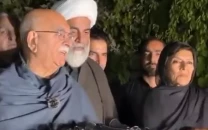Finance ministry to oversee four SOEs
Alvi inks ordinances to make NHA, PNSC, state-run radio and postal services independent

The National Highway Authority (NHA), Pakistan National Shipping Corporation (PNSC), Radio Pakistan and Pakistan Post will now function under independent boards – as the caretaker government kicked off a process to meet another condition set by the International Monetary Fund (IMF) for the release of the next tranche of $700 million to the country under the $3 billion stand-by arrangement.
President Dr Arif Alvi has given the nod to the ordinances related to the four non-profitable and loss-making state-owned enterprises (SOEs) – making them independent but under the finance ministry's oversight. On the advice of the interim premier, the president signed the Pakistan Broadcasting Corporation Amendment Ordinance, 2023; NHA Amendment Ordinance, 2023; Pakistan Postal Services Management Board Amendment Ordinance, 2023; and Pakistan National Shipping Corporation Amendment Ordinance, 2023.
According to the sources, the framework for changing the administrative structure of the four institutions has also been prepared.
They will now operate under the management of independent boards each comprising of six to 12 members. According to the sources, Pakistan Television Corporation, Pakistan Customs and Pakistan Steel Mills will also be made independent institutions in the second phase.
Read Senate extends NAB amendment ordinance for 120 days
The interim law ministry will introduce ordinances for this purpose soon. In August this year, the IMF representative in Pakistan said the reform process to which the government had agreed required the country to keep all SOEs under the finance ministry's oversight.
“Following through on the previously agreed 2021 triage reform process, and other governance and private sector reforms, is important to durably attract foreign investment,” IMF’s Esther Perez Ruiz said in a statement to Reuters. According to a statement issued by the Press Information Department, the secretaries of all the relevant ministries informed the president of the urgent need for these ordinances as the matter was settled with the IMF in July this year in connection with these four SOEs.
The president has signed the ordinances to comply with the State-Owned Enterprises (Governance and Operations) Act, 2023 enacted in January this year. The law was enacted to improve the governance and operations of SOEs for enhancing the quality of service delivery and to bring about fiscal discipline.
“The government is now in the process of extending the provisions of the SOE law to such entities that are governed by special statutes. This will make their operations efficient and transparent,” the statement added. It further read that these amendments were part of the SOE reforms agreed by the Pakistani government with its international partners and included in the standby agreement with the IMF as a structural benchmark.
Read IMF secured autonomy to access SBP info: Fawad
The statement read that through the new amendments, the offices of the chairman of the board and the chief executive would be separated in these entities to ensure good governance in line with international best practices. It continued that independent members would be inducted in the boards of the entities, adding fresh ideas and expertise in the decision-making process.
The security of the tenure of independent members would also be ensured.
The amendments would also ensure applicability of other provisions of the SOE Act, for example regular reporting of an entity’s performance to the Central Monitoring Unit (CMU). The CMU has been established in the finance ministry for monitoring the performance of the SOEs; preparation of annual business plans; and preparation and public disclosure of their reports to better inform the public about them.
According to the statement, the measures will increase the transparency, efficiency and oversight of these entities. The CMU will regularly report the performance of the entities to the Cabinet Committee on SOEs, thereby ensuring much needed visibility of their strengths and weaknesses to the highest forums within the federal government.
“Overall, the amendments in the laws of these state-owned entities will lead to better governance, service delivery and accountability to the public,” the statement concluded.
(With input from agencies)



















COMMENTS
Comments are moderated and generally will be posted if they are on-topic and not abusive.
For more information, please see our Comments FAQ